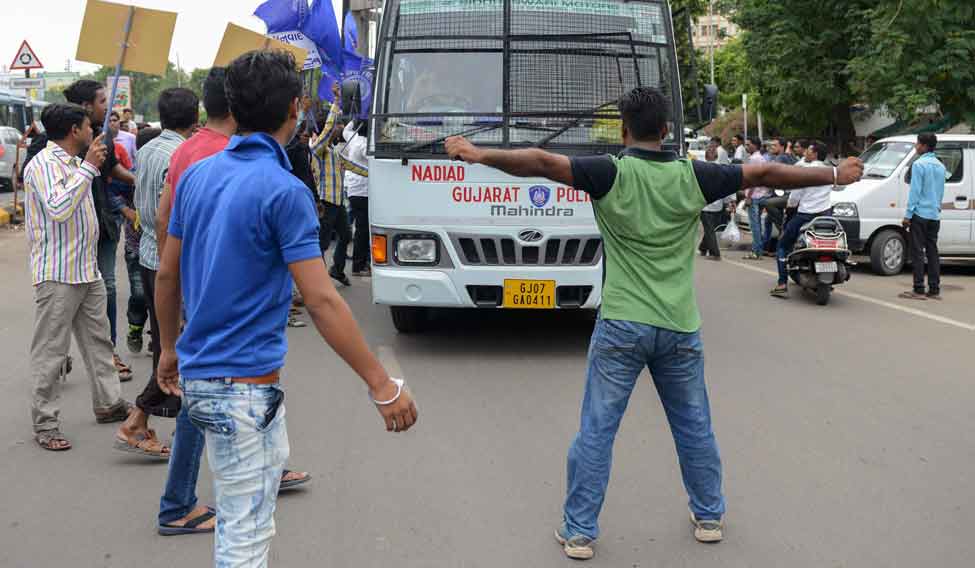Be it the Una incident or Dayashankar’s statement on Mayawati or any other in a long list of gruesome acts—all these purport to show that dalits are lesser than even some non-homo sapiens like cows, snakes and monkeys. All these species of animals are worshipped in one way or the other, and even those who have faith in this kind of spirituality, believe that untouchables and women are of much lesser importance.
Had it not been so, dalits in Una would not have been beaten up. Though they had only skinned and not killed a cow; even if they had, human race should have been considered of a higher echelon in all beings. In Jhajjar district of Haryana, in October 2002, a rumour was spread that dalits had killed a cow and a mob lynched five dalits, whereas in reality, they were only carrying a cow hide. What pains most is the mindset of such people.
Violence and atrocious acts cannot be linked to any party government. More than law and order issue, it a social phenomenon. India adopted the European model of democracy without suitable modifications. At the time of Indian independence, the world was engulfed by democracy, socialism and communism. The state structured a system of welfare which secured basic needs of people like education, health, dwelling and bread. In context of European countries, such a system can work, but not in our caste-ridden society.
Normally, the state should not interfere in social and cultural matters, but in case of India, it was imminent to bring about major reforms and revolution. In the 60s and 70s, China went in for cultural revolution, even though it was atrocious. Once upon a time, China was known as the land of opium eaters and lazy people.
In our case, politicians feared a backlash from such initiatives. Not only that, they became more dogmatic and reactionary to exploit the sentiments of the masses. Khap panchayats are glorified whereas it is they who sentence whipping and death when love marriages are made out of gotra.
Just after independence, our governance failed to establish rule of law, and concession made people habitual violators of law. From filing of FIR till adjudication, loose ends perpetuated and as a result, conviction rates narrowed down to 3-4 per cent. This encouraged perpetrators of any type of crime, of which incidents like Una are a natural consequence. The perpetrators know that the poor and dalits cannot hire expensive lawyers and manage police officials, so there is hesitation in expressing their basest, animalistic instincts; their kith and caste also glorify such acts.
Whenever violence is inflicted on dalits and tribals, only their leaders and activists come to the forefront to raise such issues. Shouldn’t it be the responsibility of more than the victim’s caste and kith? The so-called higher castes should come forward and see to it that the perpetrators are brought to justice. Sometimes, they do not even acknowledge that the caste system exists.
To understand this phenomenon is the real challenge. To them, either the so-called lower castes are not fully human, or no one other than their kith and kin, have any dignity or place or they do not know the meaning of nation. How can anyone discriminate on the basis of caste if he or she has sense of nationalism and patriotism? No one can abhor the other due to caste if he claims to be civilised and a nationalist. Such problems existed in other societies too, but they were fast mitigated. Dalits, OBCs and backwards have been living with other Hindus for thousands of years, yet compartmentalisation continues.
When we look at other societies like Europe and America, they assimilated fast with yesterday’s slaves like Africans. Why did India not have heroes from upper castes like Abraham Lincoln, John Brown, Douglas and Wilber Force? Abraham Lincoln is the greatest president of the United States, who paid the price for liberating blacks with his life. Till 1955, blacks were not permitted to sit in buses when whites were present; riots broke out and Rosa Parks was humiliated when she refused to obey unwritten social laws. Whites lent the maximum support, and today that society has President Obama, the highest paid TV anchor Oprah Winfrey and more than 200 CEOs in corporate houses. In fact, sports or any other field is incomplete without the inclusion of blacks.
Even if percentage of dalits in India was equal to the percentage of blacks in the US, not in a thousand years, would there have been any chance of a dalit becoming the prime minister. Perpetrators of acts like Una and Jhajjar do not know how much they have harmed themselves and the society. In a discriminatory society, finally no one prospers and is happy, and this is the sole reason why India did not win a single battle till 1947 and still has sluggish progress. In a discriminatory society, research, science and technology, production, healthy politics, arts and culture cannot evolve, and only efforts by the government are insufficient to create a developed country.
Udit Raj is a Member of Parliament (Lok Sabha), North West Delhi. Views expressed are personal. He can be reached at dr.uditraj@gmail.com





